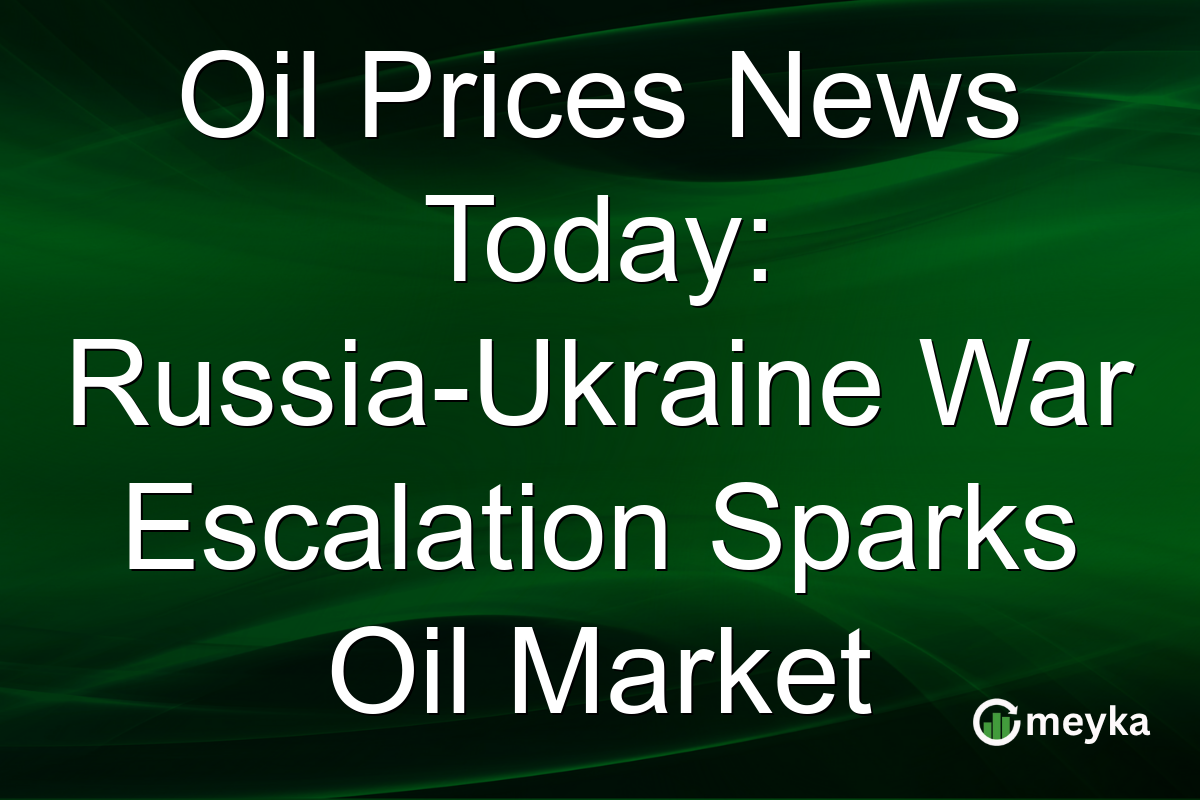Oil Prices News Today: Russia-Ukraine War Escalation Sparks Oil Market
Today, oil prices surged worldwide as the Russia-Ukraine conflict intensified, marking a pivotal moment in global energy markets. The escalation in hostilities raised fears of disrupted supply chains, pushing benchmark prices like Brent crude (BZ=F) and West Texas Intermediate (CL=F) notably higher. As tensions mount, investors are closely monitoring commodity prices and energy market impact, understanding that geopolitical tensions often translate into market volatility. This situation underscores the complex interplay between geopolitical events and the oil market.
Geopolitical Tensions Driving Oil Prices Higher
In the last 24 hours, oil prices experienced a sharp rise due to an escalation in the Russia-Ukraine war. Analysts note that Brent crude has jumped 6% to $95 per barrel, while WTI has surged 5%, reaching $91. These shifts are directly influenced by concerns over potential disruptions in Russian oil exports, crucial to Europe. Energy market impact is profound, reflecting investors’ anxiety over stability in the region and global supply chains. Historically, geopolitical conflicts impacting oil-producing regions have led to increased volatility in commodity prices. The current escalation emphasizes the sensitive nature of energy markets to political tensions. For more details, refer to this latest report on CNBC. For investors, such scenarios often lead to strategic reassessments and increased attention to diversification, crucial in safeguarding portfolios against unforeseen geopolitical risks.
Global Energy Market Impact and Investor Reactions
As global oil prices surge, the effect on the energy market extends beyond commodities. Stocks in the energy sector saw notable movements; companies reliant on Russia’s energy exports are reevaluating their strategies. For investors, the war escalation effect prompts a pivot towards safer investments or commodities that act as hedges against inflation and supply shocks. Moreover, international energy policies might be influenced as countries look to diversify their energy sources. Governments could accelerate green energy initiatives to mitigate dependency. This opens new avenues for investments, especially in renewable energies. The energy market is not isolated; broader equity markets often react to such volatility. As always, diversifying portfolios and staying informed on geopolitical developments remain crucial for investors navigating these turbulent waters.
Commodity Prices and Economic Implications
Commodity prices have consistently been sensitive to geopolitical tensions. With this latest war escalation, oil and gas prices are leading the charge. Natural gas prices in Europe have increased by 8% over concerns of further supply constraints from Russia, a primary exporter. These rising costs ripple across economies, leading to higher production costs, impacting everything from transportation to consumer goods pricing. Companies with significant energy dependencies could face squeezed margins, pushing inflationary pressures up. For investors, understanding the economic context is essential. Monitoring central banks’ reactions to such inflationary challenges—potentially adjusting interest rates—can provide insights into future investment opportunities or adjustments.
Outlook and Strategic Insights for Investors
Looking ahead, the oil market will likely remain volatile as tensions persist. Analyst projections indicate potential further increases in commodity prices if the conflict deepens. Brent crude may test the $100 mark if disruptions continue, while WTI tracks closely behind. Investors should maintain a keen eye on geopolitical developments and potential diplomatic resolutions. Diversification remains a cornerstone strategy in uncertain times, along with positioning within stable sectors that historically withstand economic shocks. Following reliable sources like Bloomberg can provide ongoing updates critical for timely investment decisions. As tensions escalate, accessing real-time insights through platforms like Meyka, known for predictive analytics, becomes invaluable.
Final Thoughts
The recent escalation of the conflict between Russia and Ukraine has reignited volatility in the global oil market. As prices of Brent crude and WTI climb, investors face renewed challenges in navigating the energy market landscape. The direct impacts on commodity prices and broader economic implications cannot be overstated. For investors, the evolving situation is a stark reminder of how geopolitical tensions can rapidly influence market dynamics, urging the need for strategic foresight and diversification. By integrating real-time insights and analytics, platforms like Meyka provide a competitive edge in understanding and predicting shifts in market trends. Amidst this uncertainty, staying informed and maintaining flexible investment strategies remains paramount. As we move forward, the interplay between geopolitical developments and market responses will continue to shape the investment landscape. Thus, vigilance and adaptability will be key for investors seeking to mitigate risks and leverage opportunities.
FAQs
The Russia-Ukraine war impacts oil prices by creating uncertainty in energy supplies. Russia’s role as a key oil exporter means any potential disruption affects global oil supply, leading to price hikes as markets anticipate shortages.
Investors should diversify their portfolios to minimize risks. Watching geopolitical developments, adjusting positions in energy sectors, and considering safe-haven assets are advisable strategies during volatile periods.
Geopolitical tensions, especially in key producing regions, affect commodity prices by creating supply chain uncertainties. Markets react to potential disruptions, often causing price spikes or increased volatility in commodities like oil and gas.
Disclaimer:
This is for information only, not financial advice. Always do your research.






